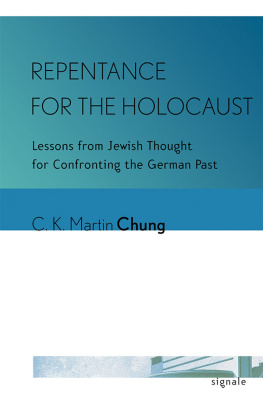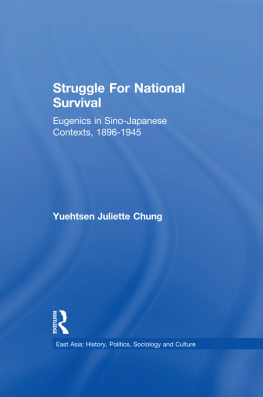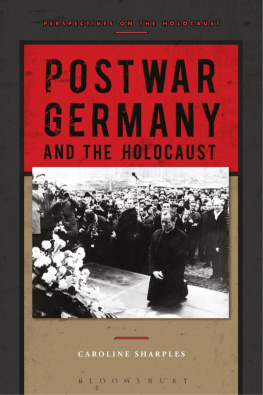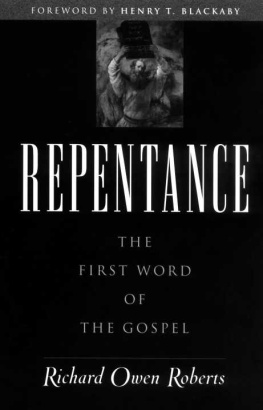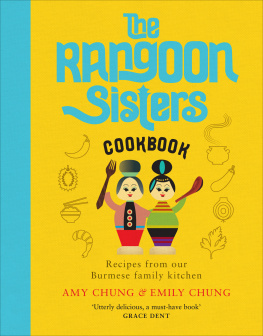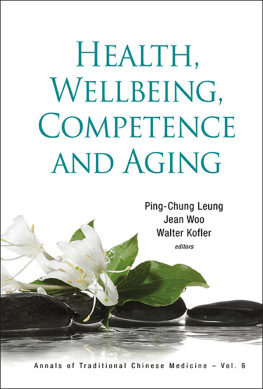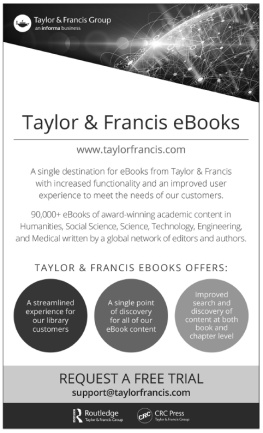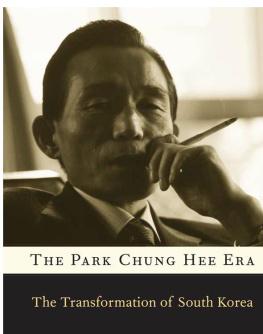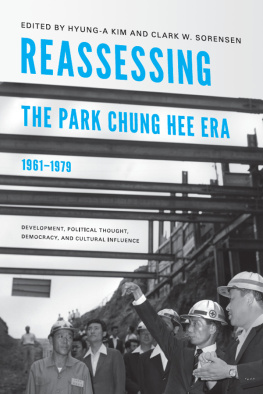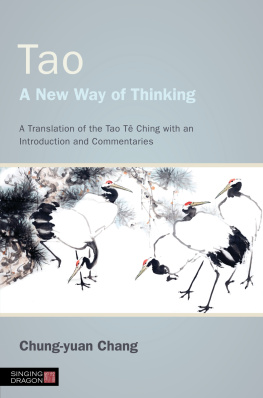Repentance for the Holocaust
Lessons from Jewish Thought for Confronting the German Past
C. K. Martin Chung
A Signale Book
Cornell University Press and Cornell University Library
Ithaca and London
For Queenie, Natalie, and Tin Yu
Die groe Schuld des Menschen sind nicht die Snden, die er begehtdie Versuchung ist mchtig und seine Kraft gering! Die groe Schuld des Menschen ist, da er in jedem Augenblick die Umkehr tun kann und nicht tut.*
Rabbi Bunam
Christen wnschen nicht, der Bue oder dem Chaos zu entgehen, wenn Gottes Wille es ber uns bringen will. Wir mssen dieses Gericht als Christen annehmen.**
Dietrich Bonhoeffer
* The major guilt of human beings is not the sins they have committedfor the temptation is powerful and their power little! The major guilt of human beings is that in every moment they can repent but do not. Quoted in Die groe Schuld, Freiburger Rundbrief 15, no. 57/60 (1963/1964): 32.
** Christians ask not to escape from repentance or chaos if it is what the will of God has in store for us. We must accept this proceeding as Christians. Quoted in George K.A. Bell, Die kumene und die innerdeutsche Opposition, Vierteljahrshefte fr Zeitgeschichte 5, no. 4 (1957): 369.
Contents
Acknowledgments
This book would not have come into being without the support of many. First and foremost, I would like to thank Wayne Cristaudo and C. Roland Vogt, for their enduring mentorship and friendshipeven after my graduation from the University of Hong Kong. At Hong Kong Baptist University, I am indebted to Jean-Pierre Cabestan and H. Werner Hess, who gave me the opportunity to work at the European Union Academic Programme Hong Kong, where I finished the revision of the manuscript of this book.
The improvement of this work has benefited tremendously from the recommendations of the editorial board of Signale, Peter Uwe Hohendahl, the series editor, and the two anonymous readers. I am grateful for their thoughtful suggestions, and also for the encouragement of Kizer Walker, the managing editor of the series. To Marian Rogers, my copyeditor, I want to say a special word of thanks and admiration: her professionalism and dedication were humbling and heartening at the same time. I felt truly privileged to have worked with her on this project.
Previously, I profited greatly from the critiques of Christopher Hutton, Stefan Auer, and Dan Diner, former director of the Simon Dubnow Institute (SDI) at Leipzig University. I am particularly pleased that an article version of this book is included in the SDI Yearbook for 2015. Without the perseverance of Petra Klara Gamke-Breitschopf, the manuscript editor, I dont think I would have come this far.
For my wider intellectual and professional development, I am irreparably indebted to Sid Ching, Alberto Rossa CMF, Marcelino Fonts CMF, Peter Chung, Beatrice Leung SPB, Chan Wai Chi and Tam Yik Fai, Laureen Velasco, Milette Zamora and Victor Gojocco, Jos Lus de Sales Marques, Ivo Carneiro de Sousa and Thomas Meyer, Keith Morrison, ric Sauted, milie Tran, Dominique Tyl SJ and Yves Camus SJ, Dixon Wong, Kendall Johnson, Louise Edwards and Andreas Leutzsch, Matthias Christian SVD, Anton Weber SVD, Ludger Feldkmper SVD and Heinz-Gerhard Justenhoven, Manfred Henningsen, Sander Gilman, Paul Bacon, Yang Daqing, Annika Frieberg, Pesach Schindler, Ephraim and Steffie Kaye, Irene Eber, Lauren Pfister, John Paul Lederach, Edward Kaplan and Glenn Timmermans.
Above all, I thank my wife, Queenie, for her unfailing love and support. It has not been easy to have a husband who is regularly away doing research year after year, especially when with two daughters at home to take care of in addition to a full-time job. Had her yes been less unswerving at any point in the last ten years or so, I might have stopped somewhere midway. For this reason, my final thank-you goes to my mother-in-law, Vanessa, for stepping in when we most needed an extra pair of hands at home.
Introduction
The German Problem of Vergangenheitsbewltigung
A national catastrophe, a physical and psychic collapse without parallel
Thomas Mann, 1945
Here then is a whole people in a state of spiritual ruin such as has never been known, perhaps, in the history of the world.
Victor Gollancz, 1946
I
This book develops the biblical idea of turning ( tshuvah in Hebrew) into a conceptual framework to analyze a particular area of contemporary German history, often loosely referred to as coming to terms with the past ( Vergangenheitsbewltigung in German, or VgB for short). It examines a selection of German responses to the the book asserts that the religious texts from the Old Testament encapsulating this idea are viable intellectual resources for dialogues among victims, perpetrators, bystanders, and their later generations in the discussion of guilt and responsibility, justice and reparation, remembrance and reconciliation. It thus is perhaps one of the greatest ironies of the twentieth century, in which Nazi Germany had sought to eliminate each and every single Jew within its reach, that postwar Germans have relied on the Jewish device of repentance as a feasible way out of their unparalleled national catastrophe (Mann), their unprecedented spiritual ruin (Gollancz).
The controversial nature of the research materials in question necessitates a further clarification of the aims and limits of this study before we venture into the relevant literature, methodology, and structure of the book. First and foremost, this is neither Likewise, in documenting Jewish efforts of turning in correspondence with the biblical idea of assisted repentance (i.e., God helping the sinner repent, who is unable to transform himself if left alone), there is no intentionexplicit or implicitto suggest that Jewish victims were themselves guilty, hence in need of repentance vis--vis the Germans; co-repentance in this sense is categorically rejected by the author. Rather, when mutual-turning is spoken of in this study, it is meant to describe the process in which the victims, who did not need turning, turned nonetheless in aid of the turning of the wrongdoers, who needed it. It is to the explication of the multiple senses of turning (both biblical and historical) that this research dedicates itself. Neither a German nor a Jew, I do not see it as my duty to defend one or the other in their responses to the Shoah, or to idealize particular individuals, significant as their turning contributions might be. If there is something to defend in this book, it is the biblical notion of repentance, which is its core and organizing principle, as a viable blueprint for international reconciliation.

